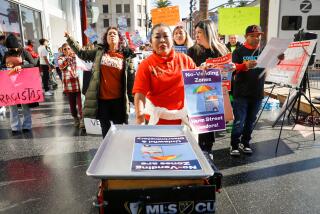DOWNTOWN : Hearing on Vendor Law Attracts 200
- Share via
Leobardo Cabral of Pico-Union stood before the City Council’s Public Works Committee last week and defended street vending, his livelihood for the past 20 years.
“All we want is to make a living,” said Cabral, president of the Asociacion de Vendedores Ambulantes, or Street Vendors Assn., which has sought for six years to legalize street vending.
Cabral was one of about 200 people who attended a public hearing Wednesday night to discuss a proposed ordinance that would legalize stationary street vending in commercial areas that have yet to be designated. The committee will meet again Friday on the proposal.
One of the main points of contention Wednesday night was how an ordinance would be enforced. Under the proposal, a vendor would apply for a specific vending site and pay a $439 business license fee. A vendor would also be required to obtain a health permit and dispose of trash left by customers.
Opponents questioned whether vendors would comply with the requirements and expressed fears about turf wars between licensed and unlicensed vendors.
“It will be a mixture between illegal vendors and legal vendors, like every other city in this country,” said Mary Lou Holte, founder of Town Keepers Action Group, composed of business and community organizations. “We don’t have enough police and health resources to enforce this. I cannot understand why the City Council is going to pass something that is going to create so many problems.”
Councilman Richard Alarcon, chairman of the committee, said that “if it’s going to work, self-policing by vendors and community advisers, combined with the infraction process, will have to keep the system in check.”
Many of the vendors said ignorance and racism are the main obstacles to street vending.
“Many of us were born in this country,” said Pablo Hernandez, a vendor from Orange. “But they see our brown faces and assume we are illegal. We are willing to work. We will help keep the city clean. We will pay taxes. But that isn’t enough.”
Ezekiel Mobley told the committee that many African-Americans also do street vending, especially since last year’s riots.
“Street vending has traditionally been a place where the economically disadvantaged have been able to provide for themselves, and it should not be illegal,” he said.
More to Read
Sign up for Essential California
The most important California stories and recommendations in your inbox every morning.
You may occasionally receive promotional content from the Los Angeles Times.










